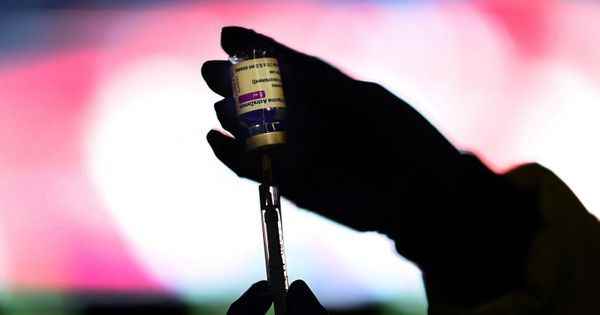Posted , update
3 min read
Vaccination against Covid-19 at the origin of more dangerous variants? Refuted by immunologists, this theory of a “bacteriological time bomb” triggered by vaccines is spreading on social networks, at the risk of fueling mistrust.
This new angle of attack against vaccines, deployed on conspiratorial sites and accounts, plays on several tables: it is adorned with a light scientific varnish and sharpens fears when the epidemic wave returns to Europe under the effect of British variant.
As often in the “complosphere”, this disinformation takes very diverse forms. Shared more than 1,000 times in a few days, some Facebook posts opt for a very direct style: “Vaccinated people are walking bacteriological time bombs and a THREAT to society”, they claim, all illustrated by sticks of dynamite connected to a detonation system.
“Vaccinated people are (…) most likely to infect others with super strains“, supports the article to which these Facebook posts refer.
Other publications based on the statements of a former research director at Inserm maintain, without any proof, that the vaccinated would be “more contagious”.
In a more civilized register, a letter from a Belgian scientist, Geert Vanden Bossche, has carved out a small success on Facebook by advancing the idea that the vaccination could cause a massive “adaptive immune leak” which will eventually strengthen the virus .
“The more we use these vaccines to immunize people in the midst of a pandemic, the more infectious the virus will be.“, he detailed.
Already accused of causing side effects, anti-Covid vaccines would therefore be worse than evil, according to these theories which argue for stopping vaccination.
A misunderstanding
These publications are based on a misunderstanding, according to several immunologists interviewed by AFP who affirm that vaccinations should, on the contrary, be as rapid as possible to limit the risks of multiplication of potentially dangerous variants.
Sars-Cov-2, like any virus, continuously mutates because small copying errors in its genetic code occur every time it replicates in order to multiply. Some of these mutations will have no major effect, but others may make it more infectious, more deadly or more resistant to antibodies.
At the end of natural selection, it is the mutations most useful for its survival that are most likely to prosper. From where the potential risk that it manages to be reinforced vis-a-vis the antibodies, natural like vaccines.
“One of the risks of being a little soft in vaccination is that the variants settle in our territory“, recently estimated the virologist Stéphanie Haim-Boukobza.
“The greater the circulation (of the virus, editor’s note), the more opportunities you leave for the virus to find solutions to a problem such as vaccination or immunity“, abounds the epidemiologist Pascal Crepey, estimating that it was necessary to leave the virus” as little time “as possible.
“If you put a very small amount of insecticide on an anthill every day, you will kill a few percent of the ants and then some ants will become very resistant to the insecticide. Whereas if you put in a large amount at once, mutants will never be able to survive“, summarizes Michel Moutschen, professor in immunopathology.
According to these specialists, it is therefore by letting the virus circulate freely that we take the most risks.
“If the virus has evolved and had, by chance, a mutation that allows it to resist the immune system, it will succeed in falling through the cracks. This is a bit of what we fear: that the variants will manage to pass through the filter exerted by vaccination“, explains Vincent Maréchal, professor of virology at Sorbonne University.
And if the vaccines can thus let “pass variants”, that does not mean at all that they are at the origin, he adds.
The British variant appeared about two months before the start of the vaccination campaign in the United Kingdom in early December. As for his Brazilian cousin, he was born in a region where the virus circulated unhindered.
“Covid-19 vaccines do not make the variant, confirms Olivier Schwartz, head of the virus and immunity unit at the Institut Pasteur. The risk, however, is that they are not effective enough to prevent these mutations.“.
.
dts2
